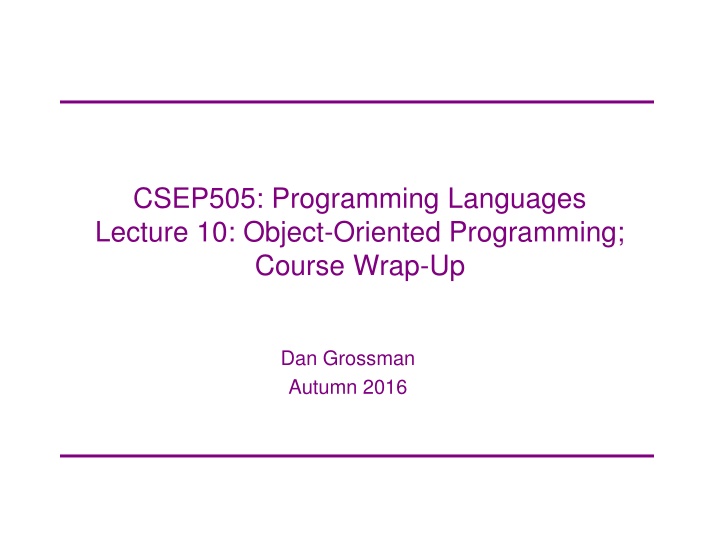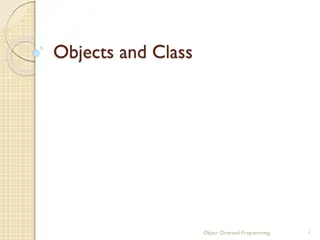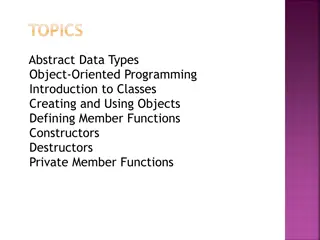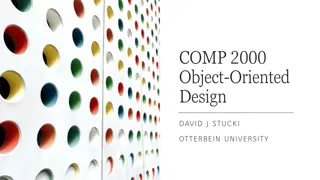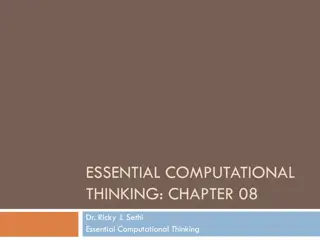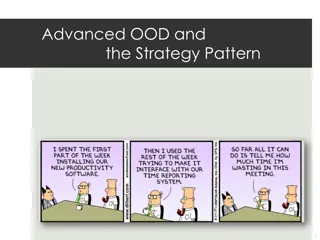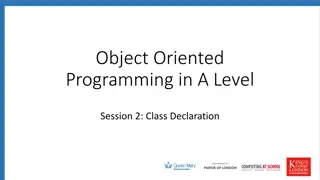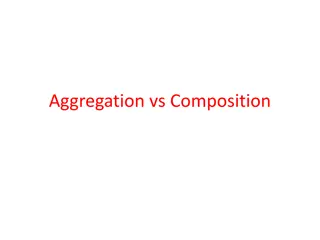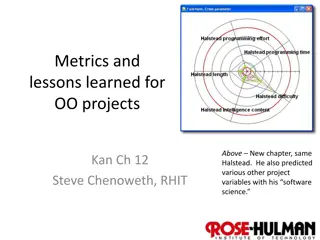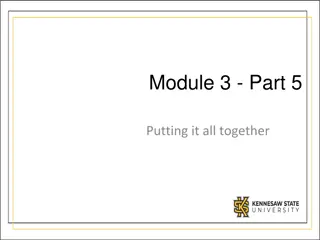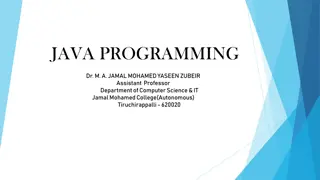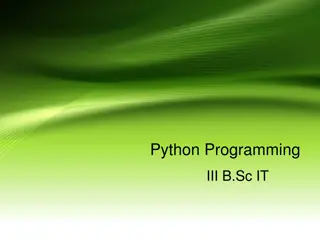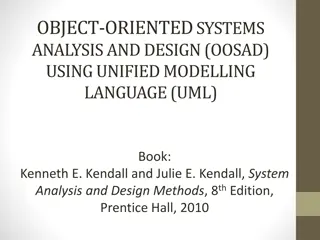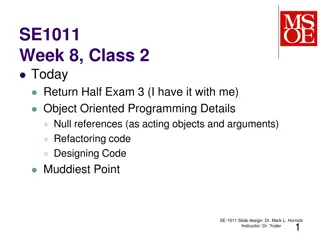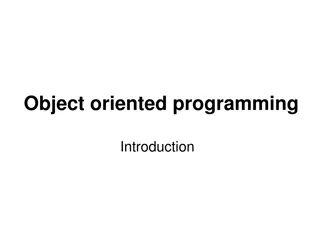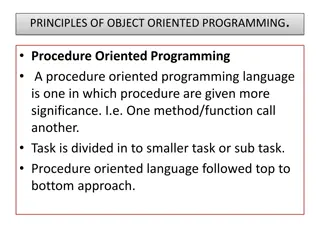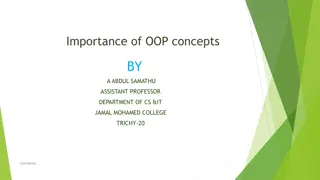Object-Oriented Programming Essentials
Object-oriented programming (OOP) delves into class-based structures, extensibility, and message-passing between objects. It offers a concise way to build software but comes with complex semantic and stylistic challenges. Explore the essence of OOP through pseudocode examples and understand the principles of class-based OOP and pure OOP.
Download Presentation

Please find below an Image/Link to download the presentation.
The content on the website is provided AS IS for your information and personal use only. It may not be sold, licensed, or shared on other websites without obtaining consent from the author.If you encounter any issues during the download, it is possible that the publisher has removed the file from their server.
You are allowed to download the files provided on this website for personal or commercial use, subject to the condition that they are used lawfully. All files are the property of their respective owners.
The content on the website is provided AS IS for your information and personal use only. It may not be sold, licensed, or shared on other websites without obtaining consent from the author.
E N D
Presentation Transcript
CSEP505: Programming Languages Lecture 10: Object-Oriented Programming; Course Wrap-Up Dan Grossman Autumn 2016
Onto OOP Now let s talk about (class-based) object-oriented programming What s different from what we have been doing Boils down to one important thing How do we define it (will stay informal) Supporting extensibility Some issues not handled well Won t have time for: more advanced OOP topics Multiple inheritance, static overloading, multimethods, I, at least, have no regrets about making room for Haskell Lecture 10 CSE P505 Autumn 2016 Dan Grossman 2
OOP the sales pitch OOP lets you: 1. Build some extensible software concisely 2. Exploit an intuitive analogy between interaction of physical entities and interaction of software pieces It also: Raises tricky semantic and style issues worthy of careful PL study Is more complicated than functions Does notnecessarilymeanit s worse Lecture 10 CSE P505 Autumn 2016 Dan Grossman 3
So what is OOP? OOP looks like this pseudocode, but what is the essence? class Pt1 extends Object { int x; int get_x() { x } unit set_x(int y) { self.x = y } int distance(Pt1 p){ p.get_x() self.get_x() } constructor() { x = 0 } } class Pt2 extends Pt1 { int y; int get_y() { y } int get_x() { 34 + super.get_x() } constructor() { super(); y = 0 } } Lecture 10 CSE P505 Autumn 2016 Dan Grossman 4
Class-based OOP In (pure) class-based OOP: 1. Every value is an object 2. Objects communicate via messages (handled by methods) 3. Objects have their own [private] state 4. Every object is an instance of a class 5. A class describes its instances behavior Lecture 10 CSE P505 Autumn 2016 Dan Grossman 5
Pure OOP Can make everything an object (cf. Smalltalk, Ruby, ) Just like everything a function or everything a string or class True extends Boolean { myIf(x,y) { x.m() } } class False extends Boolean { myIf(x,y) { y.m() } } e.myIf((new Object() { m() { }), (new Object() { m() { })) Essentially identical to the lambda-calculus encoding of Booleans Closures are just objects with one method, perhaps called apply , and a private field for the environment Lecture 10 CSE P505 Autumn 2016 Dan Grossman 6
OOP can mean many things Why is this approach such a popular way to structure software? Implicit self/this ? An ADT (private fields)? Inheritance: method/field extension, method override? Dynamic dispatch? Subtyping? [will do types after the rest, like earlier in course] All the above (plus constructor(s)) in one (class) definition Design question: Better to have small orthogonal features or one do it all feature? Anyway, let s consider how unique to OO each is Lecture 10 CSE P505 Autumn 2016 Dan Grossman 7
OOP as ADT-focused Fields, methods, constructors often have visibilities What code can invoke a member/access a field? Methods of the same object? Methods defined in same class? Methods defined in a subclass? Methods in another boundary (package, assembly, friend, ) Methods defined anywhere? Hiding concrete representation matters, in any paradigm For simple examples, objects or modules work fine But OOP struggles with binary methods Lecture 10 CSE P505 Autumn 2016 Dan Grossman 8
Simple Example class IntStack { // fields int push(Int i) { } constructor() { } } type int_stack val empty : int_stack val push : int -> push 42 empty int_stack -> int_stack new IntStack().push(42); Lecture 10 CSE P505 Autumn 2016 Dan Grossman 9
Binary-Method Example A bag supporting choose an element uniformly at random type choose_bag val single : int -> choose_bag val union:choose_bag -> choose_bag -> choose_bag valchoose:choose_bag-> int class ChooseBag { // fields constructor(Int i){ } ChooseBag union (ChooseBag that){ } Int choose() { } Various ML implementations work fine (e.g., use an int list) Pure OOP implementation with private-to-object fields impossible Fix: widen the interface (although clients shouldn t use it) Lecture 10 CSE P505 Autumn 2016 Dan Grossman 10
Inheritance & override Subclasses: Inherit superclass members Can override methods Can use super calls Can we code this up in OCaml/F#/Haskell? No because of field-name reuse and lack of subtyping But ignoring that we can get close Lecture 10 CSE P505 Autumn 2016 Dan Grossman 11
(More than) records of functions If OOP = functions + private state, we already have it But it s more (e.g., inheritance) type pt1 = {get_x : unit -> int; set_x : int -> unit; distance : pt1 -> int} let pt1_constructor () = let x = ref 0 in let rec self = { get_x = (fun() -> !x); set_x = (fun y -> x := y); distance = (fun p -> p.get_x() +self.get_x()) } in self Lecture 10 CSE P505 Autumn 2016 Dan Grossman 12
Almost OOP? let pt1_constructor () = let x = ref 0 in let rec self = { get_x = (fun() -> !x); set_x = (fun y -> x := y); distance = (fun p -> p.get_x()+self.get_x()) } in self (* note: field reuse precludes type-checking *) let pt2_constructor () = (* extends Pt1 *) let r = pt1_constructor () in let y = ref 0 in let rec self = { get_x = (fun() -> 34 + r.get_x()); set_x = r.set_x; distance = r.distance; get_y = (fun() -> !y); } in self Lecture 10 CSE P505 Autumn 2016 Dan Grossman 13
Problems Small problems: Have to change pt2_constructor whenever pt1_constructor changes But OOPs have tons of fragile base class issues too Motivates C# s version support No direct access to private fields of superclass Big problem: Distance method in a pt2doesn t behave how it does in OOP We do not have late-binding of self (i.e., dynamic dispatch) Lecture 10 CSE P505 Autumn 2016 Dan Grossman 14
The essence Claims so far: Class-based objects are: So-so ADTs Some syntactic sugar for extension and override And: The essence of OOP (versus records of closures) is a fundamentally different rule for what self maps to in the environment Lecture 10 CSE P505 Autumn 2016 Dan Grossman 15
More on late-binding Late-binding, dynamic-dispatch, and open-recursion are all essentially synonyms The simplest example I know: let c1 () = let rec r = { even = (fun i -> i=0 || r.odd (i-1)); odd = (fun i -> i<>0 && r.even (i-1)) } in r let c2 () = let r1 = c1 () in let rec r = { even = r1.even; (* still O(n) *) odd = (fun i -> i % 2 == 1) } in r Lecture 10 CSE P505 Autumn 2016 Dan Grossman 16
More on late-binding Late-binding, dynamic-dispatch, and open-recursion all related issues (nearly synonyms) The simplest example I know: class C1 { int even(int i) { i=0 || odd (i-1)) } int odd(int i) { i!=0 && even (i-1)) } } class C2 extends C1 { // even is now O(1) int odd(int i) {i % 2 == 1} } Lecture 10 CSE P505 Autumn 2016 Dan Grossman 17
The big debate Open recursion: Code reuse: improve even by just changing odd Superclass has to do less extensibility planning Closed recursion: Code abuse: break even by just breaking odd Superclass has to do more abstraction planning Reality: Both have proved very useful; should probably just argue over the right default Lecture 10 CSE P505 Autumn 2016 Dan Grossman 18
Our plan Dynamic dispatch is the essence of OOP How can we define/implement dynamic dispatch? Basics, not super-optimized versions (see P501) How do we use/misuse overriding? Functional vs. OOP extensibility Revenge of binary methods Types for objects Our prior study of subtyping mostly suffices Subclasses vs. subtypes Lecture 10 CSE P505 Autumn 2016 Dan Grossman 19
Defining dispatch Methods compile down to functions taking self as an extra argument Just need selfbound to the right thing Approach #1: Each object has 1 code pointer per method For new C() where C extends D: Start with code pointers for D (recursive definition!) If C adds m, add code pointer for m If C overrides m, change code pointer for m self bound to the (whole) object in method body Lecture 10 CSE P505 Autumn 2016 Dan Grossman 20
Defining dispatch Methods compile down to functions taking self as an extra argument Just need selfbound to the right thing Approach #2: Each object has 1 run-time tag For new C() where C extends D: Tag is C self bound to the object Method call to m reads tag, looks up (tag,m) in a global table Lecture 10 CSE P505 Autumn 2016 Dan Grossman 21
Which approach? The two approaches are very similar Just trade space for time via indirection vtable pointers are a fast encoding of approach #2 This definition is low-level, but with overriding, simpler models are probably wrong Lecture 10 CSE P505 Autumn 2016 Dan Grossman 22
Our plan Dynamic dispatch is the essence of OOP How can we define/implement dynamic dispatch? Basics, not super-optimized versions (see P501) How do we use/misuse overriding? Functional vs. OOP extensibility Revenge of binary methods Types for objects Our prior study of subtyping mostly suffices Subclasses vs. subtypes Lecture 10 CSE P505 Autumn 2016 Dan Grossman 23
Overriding and hierarchy design Subclass writer decides what to override to modify behavior Often-claimed, unchecked style issue: overriding should specializebehavior But superclass writer typically knows what will be overridden Leads to notion of abstract methods (must-override) Classes w/ abstract methods can t be instantiated Does not add expressiveness Adds a static check C++ calls this pure virtual Lecture 10 CSE P505 Autumn 2016 Dan Grossman 24
Overriding for extensibility class Exp { // a PL example; constructors omitted abstract Exp interp(Env); abstract Typ typecheck(Ctxt); abstract Int toInt(); } class IntExp extends Exp { Int i; Value interp(Env e) { self } Typ typecheck(Ctxt c) { new IntTyp() } Int toInt() { i } } class AddExp extends Exp { Exp e1; Exp e2; Value interp(Env e) { new IntExp(e1.interp(e).toInt().add( e2.interp(e).toInt())) } Int toInt() { throw new BadCall() } // typecheck on next page } Lecture 10 CSE P505 Autumn 2016 Dan Grossman 25
Example contd We did addition with pure objects Int has a binary add method To do AddExp::typecheck the same way, assume equals is defined appropriately (structural on Typ): Type typecheck(Ctxt c) { e1.typecheck(c).equals(new IntTyp()).ifThenElse( e2.typecheck(c).equals(new IntTyp()).ifThenElse( (fun () -> new IntTyp()), (fun () -> throw new TypeError())), (fun () -> throw new TypeError())) } Pure OOP avoids instanceof IntTyp and if-statements Lecture 10 CSE P505 Autumn 2016 Dan Grossman 26
More extension Now suppose we want MultExp No change to existing code, unlike OCaml! In OCaml, can prepare with Else of a constructor [not shown] Now suppose we want a toString method Must change all existing classes, unlike OCaml! In OOP, can prepare with a Visitor pattern [not shown] Extensibility has many dimensions most require forethought! Lecture 10 CSE P505 Autumn 2016 Dan Grossman 27
The Grid You know it s an important idea if I take the time to draw a picture interp typecheck toString IntExp Code Code Code Code AddExp Code Code Code Code MultExp Code Code Code Code 1 new class Code Code Code Code 1 new function Lecture 10 CSE P505 Autumn 2016 Dan Grossman 28
Back to MultExp Even in OOP, MultExpis easy to add, but you ll copy the typecheck method of AddExp Or maybe MultExp extends AddExp, but that s a kludge Or maybe refactor into BinaryExp with subclasses AddExp and MultExp So much for not changing existing code Awfully heavyweight approach to a helper function Lecture 10 CSE P505 Autumn 2016 Dan Grossman 29
Our plan Dynamic dispatch is the essence of OOP How can we define/implement dynamic dispatch? Basics, not super-optimized versions (see P501) How do we use/misuse overriding? Functional vs. OOP extensibility Revenge of binary methods Types for objects Our prior study of subtyping mostly suffices Subclasses vs. subtypes Lecture 10 CSE P505 Autumn 2016 Dan Grossman 30
The equals mess Equalsis very common and important (cf. Java, C#, ) But it s a binary method and does not work well when combined with subclassing and overriding Summarize an hour-long lecture (!!) in a sophomore-level course* (CSE331) in the next 5 minutes [Focus on Java, which I know better] *It s not the == vs. .equals lecture that s in an earlier course Acknowledgments for slides 31-36: CSE331 instructors, particularly Michael D. Ernst Lecture 10 CSE P505 Autumn 2016 Dan Grossman 31
How equals should behave Documented contract for subclasses of class Object is sensible: reflexive, symmetric, transitive [and more, not shown here] Reflexive Confusing if an object does not equal itself a.equals(a) == true a.equals(b) b.equals(a) Symmetric Confusing if order-of-arguments matters a.equals(b) b.equals(c) a.equals(c) Transitive Confusing again to violate centuries of logical reasoning Lecture 10 CSE P505 Autumn 2016 Dan Grossman 32
Object.equals method public class Object { public boolean equals(Object o) { return this == o; } } Implements reference equality Subclasses can override to implement a different equality But library includes a contractequals should satisfy Reference equality satisfies it So should any overriding implementation Balances flexibility in notion-implemented and what-clients- can-assume even in presence of overriding Lecture 10 CSE P505 Autumn 2016 Dan Grossman 33
Correct overriding public class Duration { public int min, sec; public boolean equals(Object o) { if(! o instanceof Duration) return false; Duration d = (Duration) o; return this.min==d.min && this.sec==d.sec; } } Reflexive: Yes Symmetric: Yes, even if o is not a Duration! (Assuming o s equals method satisfies the contract) Transitive: Yes, similar reasoning to symmetric Lecture 10 CSE P505 Autumn 2016 Dan Grossman 34
But then you are stuck Only correct for the contract approach below is ignore nanoseconds , which is probably not what you want class NanoDuration extends Duration { public int nano; public NanoDuration(int min, int sec, int nano){ super(min,sec); this.nano = nano; } public boolean equals(Object o) { ????? } } Any use of nanoseconds breaks symmetry or transitivity or both When comparing a mix of Duration and NanoDuration Can change Duration s equals to be false for any subclass of Duration, but that s not what you want [for other subclasses] Lecture 10 CSE P505 Autumn 2016 Dan Grossman 35
The gotchas Duration d1 = new NanoDuration(1, 2, 3); Duration d2 = new Duration(1, 2); Duration d3 = new NanoDuration(1, 2, 4); d1.equals(d2); d2.equals(d3); d1.equals(d3); NanoDuration Duration NanoDuration 1 2 3 1 2 min min min 1 2 4 sec sec sec nano nano Lecture 10 CSE P505 Autumn 2016 Dan Grossman 36
Haskells Eq The Eq typeclass in Haskell has no such issues because it is about polymorphism and overloading, not about subclassing (==) :: Eq a => a -> a -> Bool For example, the String instance provides a function (==) :: String -> String -> Bool You can (and probably should) program this way in OOP Recall explicit dictionary C++ says functors others say function objects or add good old lambdas Caller passes in an a -> a -> Bool Lecture 10 CSE P505 Autumn 2016 Dan Grossman 37
Our plan Dynamic dispatch is the essence of OOP How can we define/implement dynamic dispatch? Basics, not super-optimized versions (see P501) How do we use/misuse overriding? Functional vs. OOP extensibility Revenge of binary methods Types for objects Our prior study of subtyping mostly suffices Subclasses vs. subtypes Lecture 10 CSE P505 Autumn 2016 Dan Grossman 38
Typechecking Remember my religion : To talk about types, first discuss what are we preventing 1. In pure OOP, stuck if we need to interpret v.m(v1, ,vn) and v has no m method (taking n args) No such method error 2. Also if ambiguous: multiple methods with same name and there is no best choice No best match error Arises with static overloading and multimethods [omitted] Lecture 10 CSE P505 Autumn 2016 Dan Grossman 39
Subtyping Most class-based OOP languages purposely confuse classes & types If C is a class, then C is a type If C extends D (via declaration) then C D Subtyping is reflexive and transitive Novel subtyping? New members in C just width subtyping Nominal (by name) instead of structural What about override Lecture 10 CSE P505 Autumn 2016 Dan Grossman 40
Subtyping, continued If C extends D, overriding m, what do we need: Arguments contravariant (assume less) Result covariant (provide more) Many real languages are more restrictive Often in favor of static overloading Some languages (e.g., Eiffel, TypeScript) try to be more flexible At expense of run-time checks/casts Good we studied this in a simpler setting! Little new to say just records of [immutable] methods Lecture 10 CSE P505 Autumn 2016 Dan Grossman 41
The One Difference In the subclass override, the method can soundly assume self is an instance of the subclass class A { Int m1() { 42 } } class B extends A { Int x; Int m2() { 73 } Int m1() { x + m2() } } So self is like an implicit argument but unlike the other arguments it is covariant This is sound because callers cannot choose what self is If they could, they could cast to supertype and pass a self that is an instance of the supertype This special treatment of is exactly why trying to do OOP in a statically typed language without OOP support works poorly Lecture 10 CSE P505 Autumn 2016 Dan Grossman 42
Subtyping vs. subclassing Often convenient confusion: C a subtype of D if and only if C a subclass of D But more subtypes are sound If A has every field and method that B has (at appropriate types), then subsume B to A Java-style interfaces help, but require explicit annotation And fewer subtypes could allow more code reuse Lecture 10 CSE P505 Autumn 2016 Dan Grossman 43
Non-subtyping example Pt2 Pt1 is unsound here: class Pt1 extends Object { int x; int get_x() { x } bool compare(Pt1 p){ p.get_x() == self.get_x() } } class Pt2 extends Pt1 { int y; int get_y() { y } bool compare(Pt2 p) { // override p.get_x() == self.get_x() && p.get_y() == self.get_y() } } Lecture 10 CSE P505 Autumn 2016 Dan Grossman 44
What happened Could inherit code without being a subtype Cannot always do this what if get_x called self.compare with a Pt1 Possible solutions: Re-typecheck get_x in subclass Use a really fancy type system Don t override compare Moral: Not suggesting subclassing not subtyping is useful, but the concepts of inheritance and subtyping are orthogonal Lecture 10 CSE P505 Autumn 2016 Dan Grossman 45
Now what? That s basic class-based OOP Note: Not all OOPLs use classes (Javascript, Self, Cecil, ) Now I d love to do some fancy stuff Multiple inheritance; multiple interfaces Static overloading Multimethods Revenge of bounded polymorphism but we are out of time for the quarter! so let s wrap-up Lecture 10 CSE P505 Autumn 2016 Dan Grossman 46
Victory Lap A victory lap is an extra trip around the track By the exhausted victors (us) Review course goals Slides from Introduction and Course-Motivation Some big themes and perspectives Stuff for five years from now more than for the final Do your course evaluations!!! Lecture 10 CSE P505 Autumn 2016 Dan Grossman 47
Thanks! To you! (On top of your day jobs!) To John! (On top of your research!) To Caryl and the kids who managed 9 bedtimes without me Lecture 10 CSE P505 Autumn 2016 Dan Grossman 48
Course [incomplete] summary Functional programming, datatypes, modularity, etc. Defining languages is hard but worth it Interpretation vs. translation Inference rules vs. a PL for the metalanguage Features we investigated Mutable variables (and loops) Higher-order functions, scope Pairs and sums Continuations Monads Typeclasses Objects Types restrict programs (often a good thing (!) then counterbalanced via flavors of polymorphism) Lecture 10 CSE P505 Autumn 2016 Dan Grossman 49
[Now a few slides unedited from Lecture 1 that probably make a lot more sense now] Lecture 10 CSE P505 Autumn 2016 Dan Grossman 50
